Social Media Addiction Lawsuits: Protecting Mental Health
- Last Updated: July 14th, 2025

Attorney Jessica Paluch-Hoerman, founder of TruLaw, has over 28 years of experience as a personal injury and mass tort attorney, and previously worked as an international tax attorney at Deloitte. Jessie collaborates with attorneys nationwide — enabling her to share reliable, up-to-date legal information with our readers.
Legally Reviewed
This article has been written and reviewed for legal accuracy and clarity by the team of writers and legal experts at TruLaw and is as accurate as possible. This content should not be taken as legal advice from an attorney. If you would like to learn more about our owner and experienced injury lawyer, Jessie Paluch, you can do so here.
Fact-Checked
TruLaw does everything possible to make sure the information in this article is up to date and accurate. If you need specific legal advice about your case, contact us by using the chat on the bottom of this page. This article should not be taken as advice from an attorney.
Key takeaways:
- Social media addiction lawsuits allege that platforms targeted teens despite knowing the risks, using features like notifications and algorithms to encourage addictive behaviors.
- Individuals filing social media addiction lawsuits may seek compensation for economic, non-economic, and punitive damages related to the mental health effects of excessive use.
- Tru Law offers experienced representation for social media addiction cases on a contingency basis, handling every step of the legal process at no upfront cost to clients.
Overview of Social Media Addiction Lawsuits
On this page, we’ll discuss Social Media Addiction Lawsuits, potential impacts of social media addiction on mental health, legal grounds for filing a social media lawsuit, and much more.
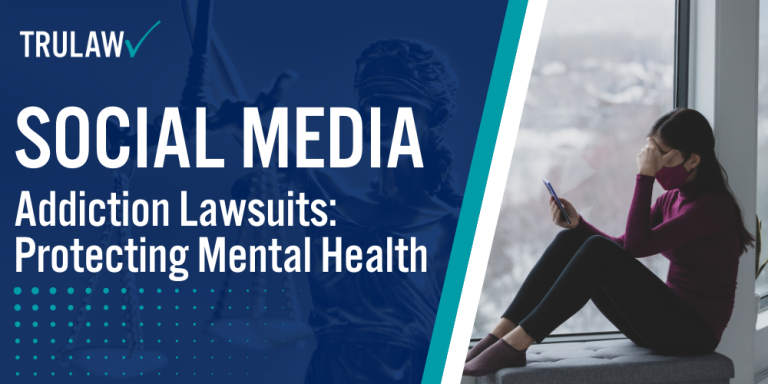
Intro to Social Media Addiction Lawsuits
Some key aspects of Social Media Addiction Lawsuits include:
- Negligent Design: Claims that social media platforms are designed to be addictive, prioritizing engagement over user well-being.
- Failure to Warn: Allegations that social media companies do not adequately warn users about the potential risks of addiction and mental health impact.
- Targeting Vulnerable Users: Accusations that social media platforms target young and impressionable users who are more susceptible to addiction.
- Lack of Regulation: Claims that the lack of regulation in the social media industry allows companies to prioritize profits over user safety.
If you or a loved one has suffered from mental health issues due to social media addiction, you may be eligible to seek compensation.
Contact TruLaw using the chat on this page for an instant case evaluation to determine if you qualify to join others filing Social Media Addiction Lawsuits.
Table of Contents
Social Media Companies Target Teens Despite Knowing Addiction Risks
Lawsuits against social media companies allege that internal research highlighting the risks of addiction was often ignored or minimized.
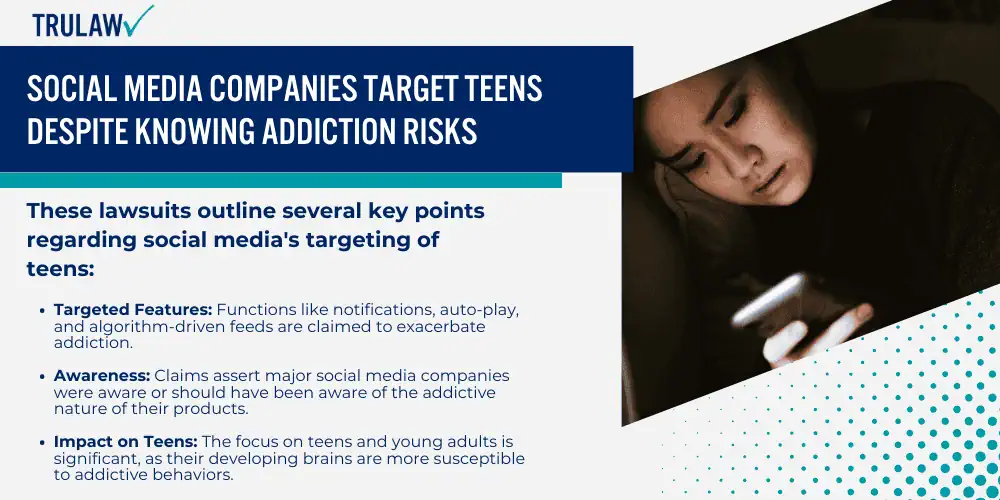
These lawsuits outline several key points regarding social media’s targeting of teens:
- Targeted Features: Functions like notifications, auto-play, and algorithm-driven feeds are claimed to exacerbate addiction.
- Awareness: Claims assert major social media companies were aware or should have been aware of the addictive nature of their products.
- Impact on Teens: The focus on teens and young adults is significant, as their developing brains are more susceptible to addictive behaviors.
- Legal Accountability: These lawsuits aim to compel social media giants to confront and address the implications of their internal research on addiction.
Evidence suggests that some platforms may have unfairly targeted younger audiences, fully aware of the potential for addictive use patterns.
Compensation Available Through Social Media Addiction Lawsuits
When individuals pursue social media addiction lawsuits, they often seek compensation for the physical and psychological harm they’ve suffered.
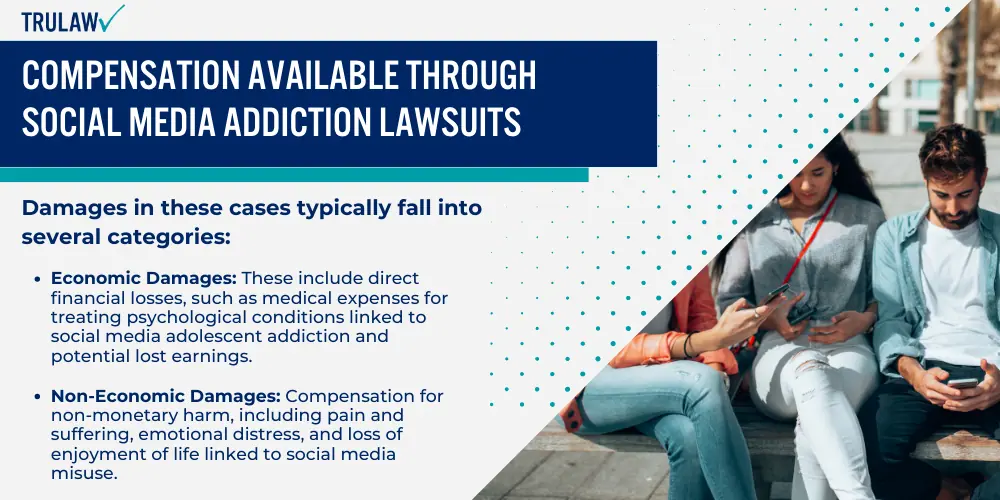
These legal actions aim to aid those affected by the mental health crisis that can be linked to extensive use of Meta and other social media platforms.
Compensation in such cases acknowledges the distress and aims to address the long-term psychological harm as well as any physical harm that can arise from addictive technologies.
Types of Damages That Can Be Recovered in a Social Media Lawsuit
Social media lawsuits aim to obtain just compensation for the harm experienced.
Damages in these cases typically fall into several categories:
- Economic Damages: These include direct financial losses, such as medical expenses for treating psychological conditions linked to social media adolescent addiction and potential lost earnings.
- Non-Economic Damages: Compensation for non-monetary harm, including pain and suffering, emotional distress, and loss of enjoyment of life linked to social media misuse.
- Punitive Damages: In cases where the defendant’s conduct is especially harmful, punitive damages may be awarded to dissuade similar conduct.
- Injunctive Relief: In some cases, the court orders the defendant to take specific actions, such as changing their software to reduce addictive features.
Individuals often engage the expertise of specialized social media attorneys to navigate the legal landscape and advocate for their best interests in securing these types of compensation.
TruLaw’s Track Record of Securing Over $9.3 Billion for Clients
The law firm TruLaw is noteworthy for its achievements on behalf of clients impacted by social media platforms.
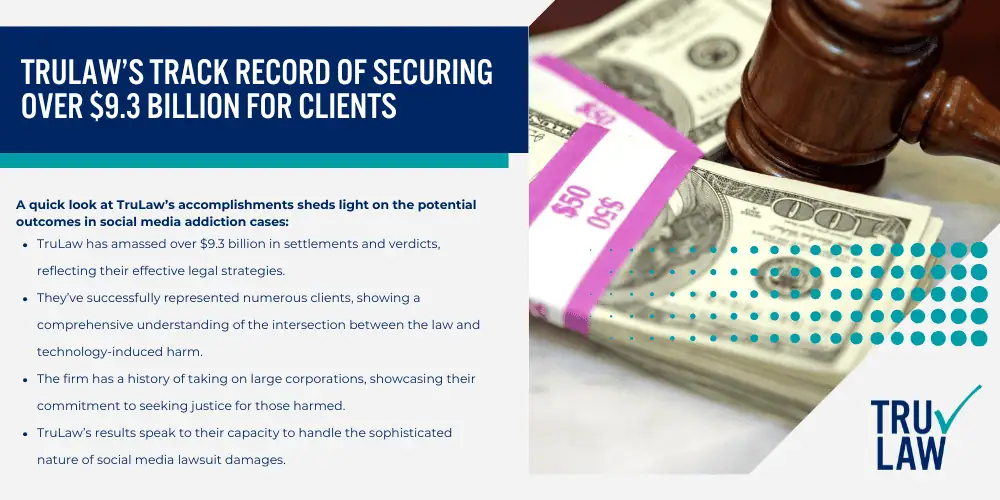
A quick look at TruLaw’s accomplishments sheds light on the potential outcomes in social media addiction cases:
- TruLaw has amassed over $9.3 billion in settlements and verdicts, reflecting their effective legal strategies.
- They’ve successfully represented numerous clients, showing a comprehensive understanding of the intersection between the law and technology-induced harm.
- The firm has a history of taking on large corporations, showcasing their commitment to seeking justice for those harmed.
- TruLaw’s results speak to their capacity to handle the sophisticated nature of social media lawsuit damages.
These examples demonstrate TruLaw’s adeptness at obtaining substantial compensation for clients suffering from social media’s addictive nature, solidifying their status as leaders in litigation.
What Is Considered Social Media Addiction in Children and Teens?
Social media addiction in children and teens is recognized when excessive use of platforms impacts their mental health and daily functioning.
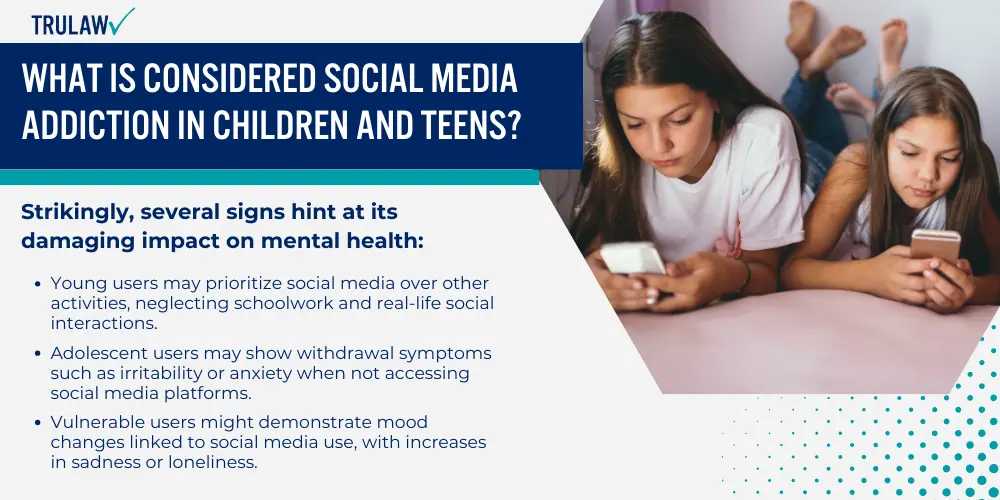
It is characterized by a behavioral addiction where young users engage in persistent and compulsive social media activities that affect their well-being.
Social Media Addiction as a Behavioral Addiction Harming Mental Health
Behavioral addiction to social media mirrors other types of addictions, where the user feels compelled to engage in activities despite negative consequences.
Strikingly, several signs hint at its damaging impact on mental health:
- Young users may prioritize social media over other activities, neglecting schoolwork and real-life social interactions.
- Adolescent users may show withdrawal symptoms such as irritability or anxiety when not accessing social media platforms.
- Vulnerable users might demonstrate mood changes linked to social media use, with increases in sadness or loneliness.
- Excessive social media use has been linked to negative body image and disrupted sleep patterns among teens, exacerbating mental health issues.
Elements of Social Media Apps That Contribute to Teen Addiction
Social media platforms are meticulously designed to engage users, particularly teens, creating a risk for addiction.
The addictive nature of these apps stems from several core features:
- Social media feeds are crafted using algorithms that ensure a constant exposure or flow of stimulating content, making it difficult for adolescent users to disengage.
- The instant gratification of likes and comments is a virtual reward, encouraging continuous checking of social media apps.
- Many social media sites incorporate features that promote social comparison, which can be particularly enticing and harmful to young people’s mental health.
- These platforms use notifications and alerts to draw users back, building habitual responses that can lead to addictive behaviors.
Considering the impact on young users, it’s clear that social media has the potential to greatly affect their lives.
As such, awareness, as well as mental health resources, are pivotal in supporting adolescent users who might be struggling with the addictive aspects of social media.
Mental Health Effects of Social Media Addiction in Young People
The pervasive influence of social media is particularly impactful on young individuals, potentially leading to a spectrum of mental health challenges.
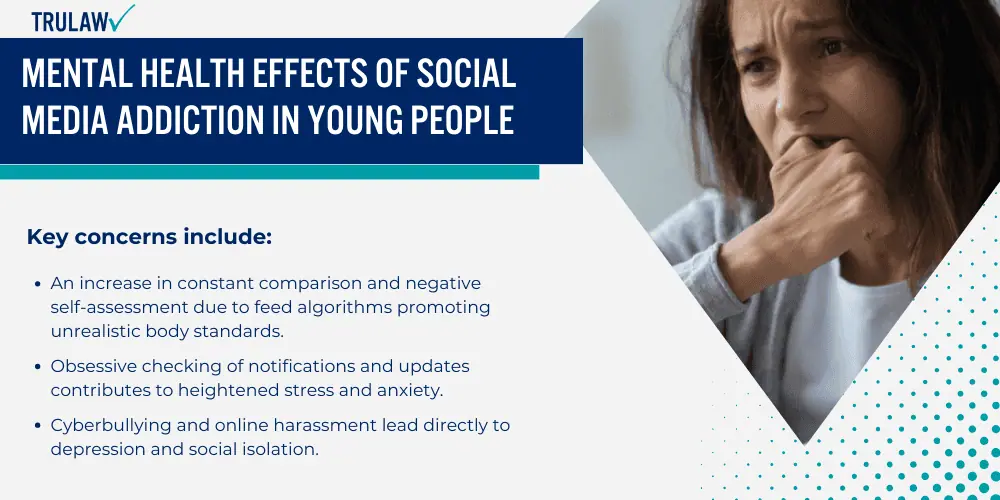
Anxiety, Depression, Eating Disorders, and Other Mental Health Issues
The prevalence of social media plays a correlational role in the onset of various mental health issues among young people.
It is apparent from systematic reviews that constant social media engagement may exacerbate conditions such as anxiety, depression, and even eating disorders.
Key concerns include:
- An increase in constant comparison and negative self-assessment due to feed algorithms promoting unrealistic body standards.
- Obsessive checking of notifications and updates contributes to heightened stress and anxiety.
- Cyberbullying and online harassment lead directly to depression and social isolation.
- The promotion of harmful and third-party content that can trigger or worsen eating disorders like anorexia or bulimia.
Multiple studies have linked excessive social media use with deteriorating mental health in young people, suggesting a careful monitoring of online activity may be beneficial.
Social Media Addiction’s Ties to Self-Harm and Suicide in Teens
Growing evidence connects social media addiction with elevated risks of self-harm and suicidal behaviors in adolescents.
Critical findings reveal:
- Distorted self-image and body dysmorphic disorder are influenced by curated content and filters.
- Intensified feelings of exclusion or inadequacy can lead to suicidal thoughts or even suicide attempts.
- Online challenges and trends that may normalize or encourage self-harm and risk-taking behaviors.
- Peer comparison heightens the risks of attempted suicide among teenagers already grappling with a mental health crisis.
With social media being intricately woven into the fabric of youth culture, its potential impact on young people’s mental health demands ongoing attention from parents, educators, and policymakers.
Warning Signs and Symptoms of Social Media Addiction to Watch For
Recognizing social media addiction involves observing specific behaviors and their effects on an individual’s life.
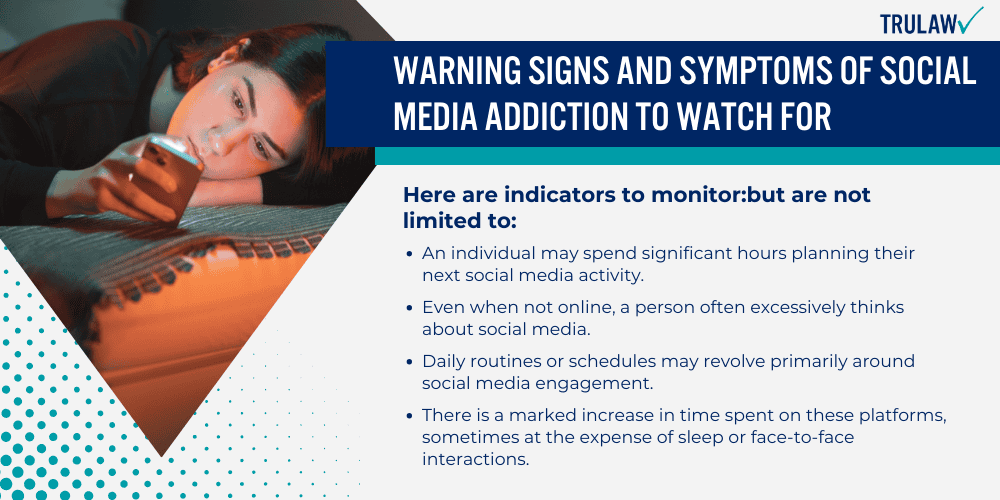
These warning signs can indicate when excessive use of social platforms goes beyond normal habits and potentially borders addiction.
Spending Excessive Time Planning and Using Social Media Platforms
Excessive time spent on social media can be one of the first signs of potential addiction.
Here are indicators to monitor:
- An individual may spend significant hours planning their next social media activity.
- Even when not online, a person often excessively thinks about social media.
- Daily routines or schedules may revolve primarily around social media engagement.
- There is a marked increase in time spent on these platforms, sometimes at the expense of sleep or face-to-face interactions.
Negative Impacts on Relationships, School, and Personal Well-Being
Social media usage becomes concerning when it negatively impacts personal well-being and everyday life.
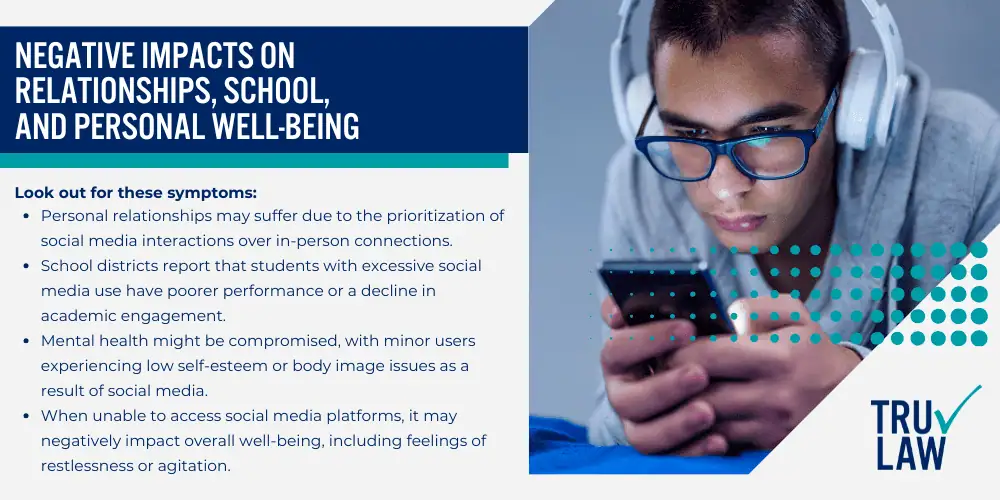
Look out for these symptoms:
- Personal relationships may suffer due to the prioritization of social media interactions over in-person connections.
- School districts report that students with excessive social media use have poorer performance or a decline in academic engagement.
- Mental health might be compromised, with minor users experiencing low self-esteem or body image issues as a result of social media.
- When unable to access social media platforms, it may negatively impact overall well-being, including feelings of restlessness or agitation.
It’s imperative to note that social media addiction can have diverse effects, and these signs could manifest differently among users.
How to File a Social Media Addiction Lawsuit With Sokolove Law
When considering legal action for social media addiction, Sokolove Law offers experienced representation to guide you through the process, ensuring no upfront costs and handling each step on your behalf.
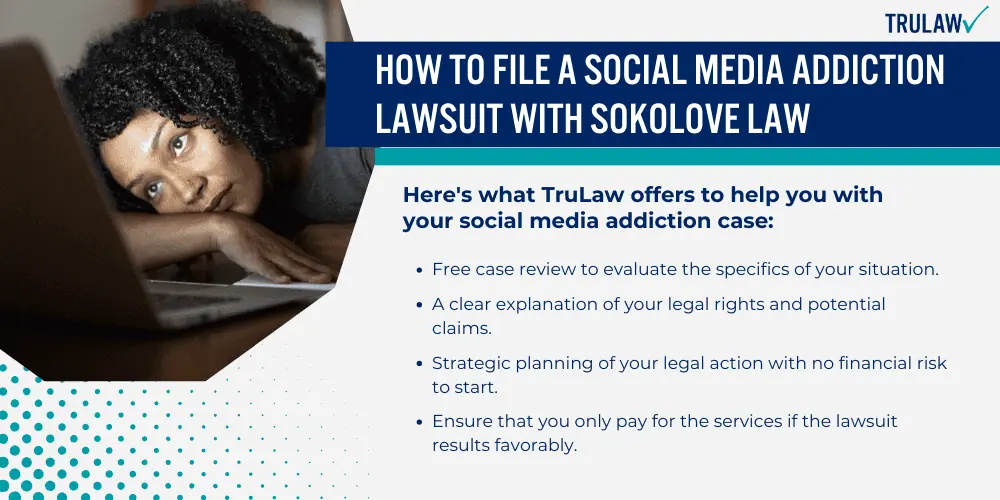
No Upfront Costs to Hire an Experienced Social Media Attorney
TruLaw offers representation for social media addiction cases without demanding payment upfront.
The firm operates on a contingency fee basis, which means clients pay attorney fees only if they win compensation for their claims.
Here’s what TruLaw offers to help you with your social media addiction case:
- Free case review to evaluate the specifics of your situation.
- A clear explanation of your legal rights and potential claims.
- Strategic planning of your legal action with no financial risk to start.
- Ensure that you only pay for the services if the lawsuit results favorably.
Lawyers Handle Every Step of the Legal Process on Your Behalf
The attorneys at Sokolove Law manage each stage of your social media lawsuit meticulously.
From filing the social media addiction claim to navigating the legal system, they take care of all the details so you can focus on other aspects of your life.
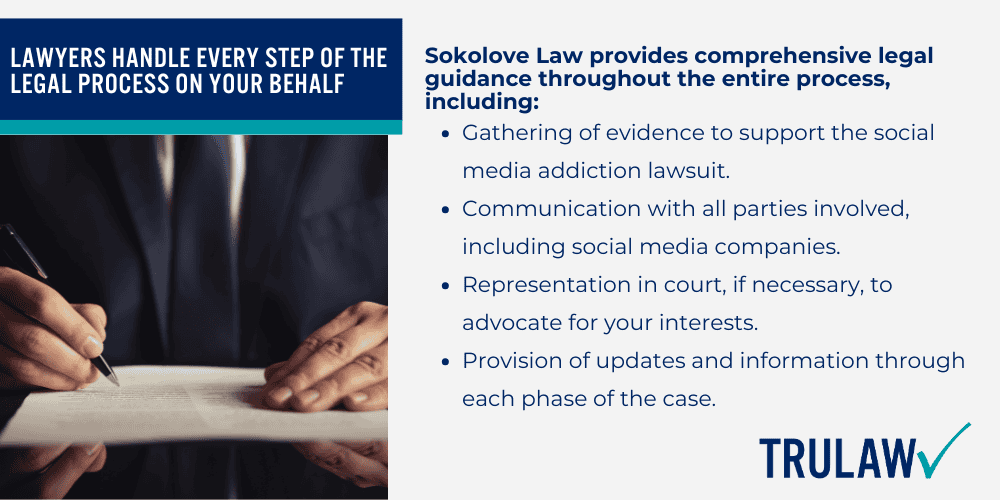
Sokolove Law provides comprehensive legal guidance throughout the entire process, including:
- Gathering of evidence to support the social media addiction lawsuit.
- Communication with all parties involved, including social media companies.
- Representation in court, if necessary, to advocate for your interests.
- Provision of updates and information through each phase of the case.
Sokolove Law offers comprehensive support for individuals seeking to file a lawsuit against social media companies.
Their approach ensures that clients are well-informed and confidently represented without upfront legal fees.
Pursuing a Social Media Addiction Settlement or Verdict Award
When individuals or groups allege harm from excessive platform use, they may opt to pursue compensation through either settlement or jury verdict.
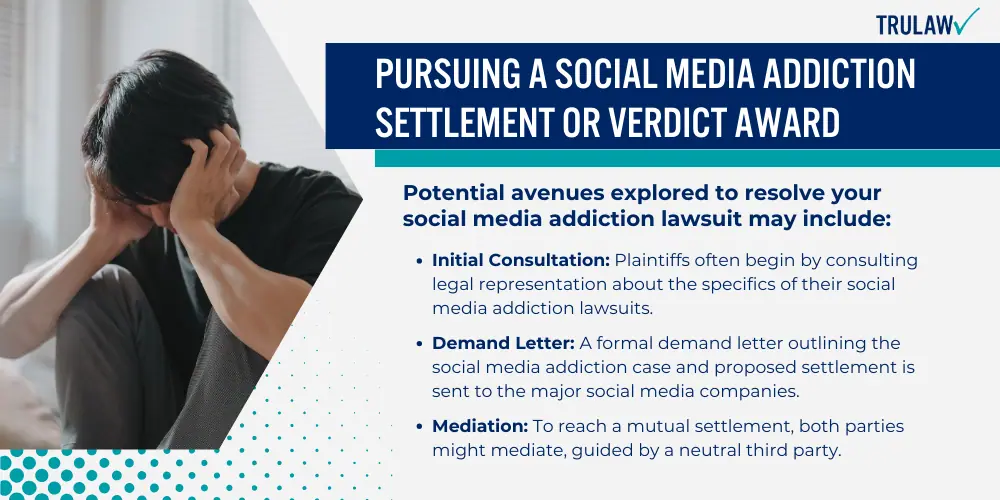
These legal pathways aim to hold social media giants accountable and seek justice for the impact of social media addiction.
Negotiations With Social Media Companies to Reach a Settlement
Negotiations are the first step in the resolution process, where plaintiffs and social media companies discuss potential compensation.
Potential avenues explored to resolve your social media addiction lawsuit may include:
- Initial Consultation: Plaintiffs often begin by consulting legal representation about the specifics of their social media addiction lawsuits.
- Demand Letter: A formal demand letter outlining the social media addiction case and proposed settlement is sent to the major social media companies.
- Mediation: To reach a mutual settlement, both parties might mediate, guided by a neutral third party.
- Settlement Agreement: If a settlement is reached, a legally binding contract is drafted detailing the compensation agreed upon by both parties.
These negotiations are typically less public than trials and can result in faster resolutions.
Taking a Social Media Lawsuit to Trial for a Jury Verdict
If settlement discussions stall, plaintiffs may proceed to trial, seeking a verdict from a jury.
- Case Filing: A social media lawsuit is officially filed in state or federal court, often in jurisdictions like California, where many social media companies are headquartered.
- Discovery Process: Both sides exchange evidence and conduct depositions to build their respective cases.
- Trial: The case is argued before a jury, and a federal or California state judge presides over the trial, ensuring legal procedures are followed.
- Jury Verdict: The jury deliberates and reaches a verdict, including monetary damages if the social media company is liable.
Trials can bring broader awareness to the impact of social media addiction and may influence changes within the industry.
What to Look for When Hiring a Social Media Addiction Lawyer
It’s important to select a lawyer with specific expertise in social media addiction law when pursuing a lawsuit.
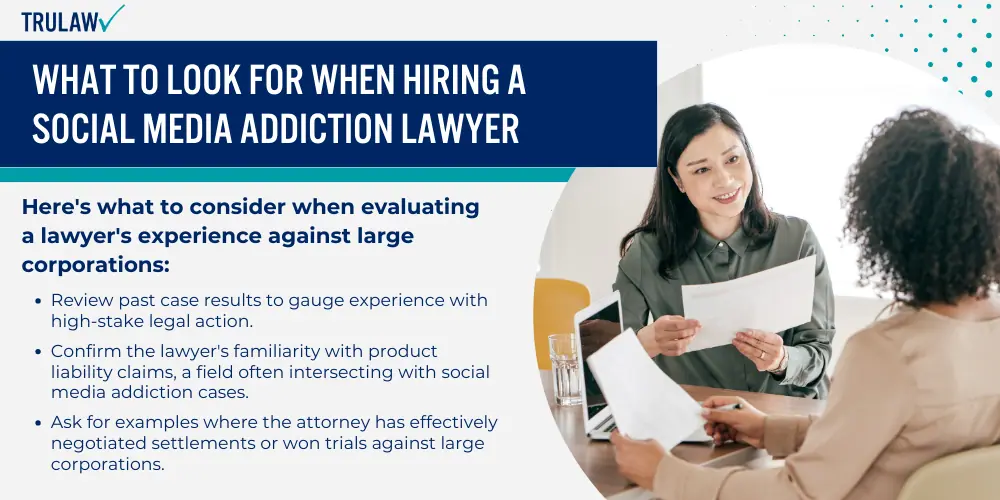
Consider attorneys who can articulate a strong strategy for holding companies accountable for their actions and have experience in product liability and multidistrict litigation.
Proven Track Record of Success in Taking on Large Corporations
Boldly examine an attorney’s history with cases against big entities.
Their success rate in such scenarios speaks volumes about their capabilities.
Here’s what to consider when evaluating a lawyer’s experience against large corporations:
- Review past case results to gauge experience with high-stake legal action.
- Confirm the lawyer’s familiarity with product liability claims, a field often intersecting with social media addiction cases.
- Ask for examples where the attorney has effectively negotiated settlements or won trials against large corporations.
- Ensure they have the resources and network to fight a prolonged legal battle, which is common in lawsuits involving large companies.
Ability to Handle Social Media Lawsuits Nationwide in All 50 States
Lawyers operating nationwide offer an advantage, particularly in multidistrict litigation.
To ensure effective representation in a nationwide social media lawsuit, consider these factors regarding the law firm’s capabilities:
- Verify if they are licensed to practice law in multiple jurisdictions or have a network.
- Determine their capacity to coordinate legal action in different states, which can streamline a nationwide social media lawsuit.
- Check for an established track record in handling cases with geographic diversity.
- Cross-check whether the firm has resources, such as partnerships with other states, to manage logistics and local expertise.
Social Media Harm Lawsuits Frequently Asked Questions
-
Individuals who believe social media platforms have harmed them may file a personal injury lawsuit if the harm can be linked to the platform’s operations.
They may also join a class action lawsuit if one exists and their situation aligns with the class members’ experiences.
-
Yes, individuals can potentially receive compensation for mental health problems attributed to social media use if they can establish that the platform’s negligent design contributed to their condition.
-
Recent case studies include multi-district litigation against major social media companies, alleging product defects designed to maximize user screen time.
Several state attorneys have also filed lawsuits against companies like Meta for knowingly deploying harmful features on platforms like Instagram.
-
Class action lawsuits aggregate individual claims against social media companies into a single claim, representing all affected parties.
Such lawsuits for addiction claims argue for damages due to the alleged design of addictive features in social media platforms.
-
A lawyer in a social media addiction harm case provides legal counsel, represents the client’s interests in court, and helps in demonstrating the causal link between platform use and the client’s harm.
-
While there have been numerous filings, as of now, there have not been any widely recognized landmark decisions in courts specifically about social media addiction.
The legal landscape is continually evolving, with new cases being filed.

Managing Attorney & Owner
With over 25 years of legal experience, Jessica Paluch-Hoerman is an Illinois lawyer, a CPA, and a mother of three. She spent the first decade of her career working as an international tax attorney at Deloitte.
In 2009, Jessie co-founded her own law firm with her husband – which has scaled to over 30 employees since its conception.
In 2016, Jessie founded TruLaw, which allows her to collaborate with attorneys and legal experts across the United States on a daily basis. This hypervaluable network of experts is what enables her to share the most reliable, accurate, and up-to-date legal information with our readers!
Additional Social Media Harm Lawsuits resources on our website:
Here, at TruLaw, we’re committed to helping victims get the justice they deserve.
Alongside our partner law firms, we have successfully collected over $3 Billion in verdicts and settlements on behalf of injured individuals.
Would you like our help?
At TruLaw, we fiercely combat corporations that endanger individuals’ well-being. If you’ve suffered injuries and believe these well-funded entities should be held accountable, we’re here for you.
With TruLaw, you gain access to successful and seasoned lawyers who maximize your chances of success. Our lawyers invest in you—they do not receive a dime until your lawsuit reaches a successful resolution!
AFFF Lawsuit claims are being filed against manufacturers of aqueous film-forming foam (AFFF), commonly used in firefighting.
Claims allege that companies such as 3M, DuPont, and Tyco Fire Products failed to adequately warn users about the potential dangers of AFFF exposure — including increased risks of various cancers and diseases.
Depo Provera Lawsuit claims are being filed by individuals who allege they developed meningioma (a type of brain tumor) after receiving Depo-Provera birth control injections.
A 2024 study found that women using Depo-Provera for at least 1 year are five times more likely to develop meningioma brain tumors compared to those not using the drug.
Suboxone Tooth Decay Lawsuit claims are being filed against Indivior, the manufacturer of Suboxone, a medication used to treat opioid addiction.
Claims allege that Indivior failed to adequately warn users about the potential dangers of severe tooth decay and dental injuries associated with Suboxone’s sublingual film version.
Social Media Harm Lawsuits are being filed against social media companies for allegedly causing mental health issues in children and teens.
Claims allege that companies like Meta, Google, ByteDance, and Snap designed addictive platforms that led to anxiety, depression, and other mental health issues without adequately warning users or parents.
Transvaginal Mesh Lawsuits are being filed against manufacturers of transvaginal mesh products used to treat pelvic organ prolapse (POP) and stress urinary incontinence (SUI).
Claims allege that companies like Ethicon, C.R. Bard, and Boston Scientific failed to adequately warn about potential dangers — including erosion, pain, and infection.
Bair Hugger Warming Blanket Lawsuits involve claims against 3M — alleging their surgical warming blankets caused severe infections and complications (particularly in hip and knee replacement surgeries).
Plaintiffs claim 3M failed to warn about potential risks — despite knowing about increased risk of deep joint infections since 2011.
Baby Formula NEC Lawsuit claims are being filed against manufacturers of cow’s milk-based baby formula products.
Claims allege that companies like Abbott Laboratories (Similac) and Mead Johnson & Company (Enfamil) failed to warn about the increased risk of necrotizing enterocolitis (NEC) in premature infants.
Here, at TruLaw, we’re committed to helping victims get the justice they deserve.
Alongside our partner law firms, we have successfully collected over $3 Billion in verdicts and settlements on behalf of injured individuals.
Would you like our help?
